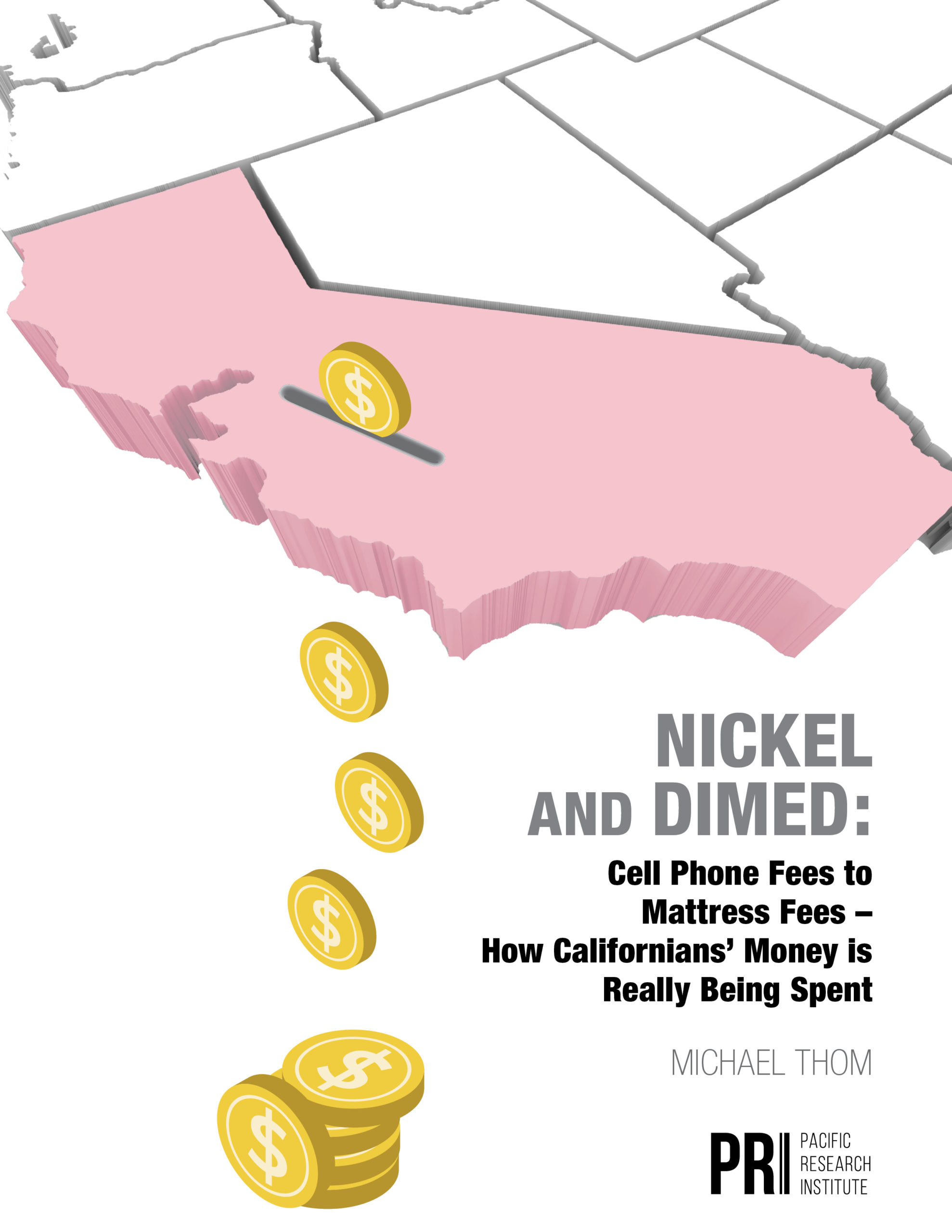California “nickel and dimes” consumers with hundreds of dollars in fees annually for under-utilized services, and their repeal would give relief from the high cost-of-living and make fees more efficient and accountable, finds a new study released today by California-based, nonpartisan, free-market think tank, the Pacific Research Institute.
“While broad tax reforms in California are notoriously tricky, policymakers can offer much-needed relief to consumers by reducing the burden imposed by state and local government fees,” writes Michael Thom, Ph.D., PRI Adjunct Fellow in Public Finance and the study’s author. “California’s survival is inextricably linked with reducing the cost to live and work here.”
In “Nickel and Dimed: Cell Phone Fees to Mattress Fees – How Californians’ Money is Really Being Spent,” Thom reviews three categories of fees paid by Californians – driving fees, cell phone fees, and environmental fees.
He documents several state and local vehicle registration fees that add hundreds of dollars to the cost of purchasing and operating a car or truck. Yet, consumers have little to show for the high taxes and fees they pay. Thom notes that California has been given below average grades on two recent national report cards for transportation infrastructure, even though the state’s drivers pay the nation’s highest gas taxes and an annual Transportation Improvement Fee.
He proposes replacing the Transportation Improvement Fee with a broad-based, road user charge, where vehicle owners would pay a fee for each mile they drive. If a road user chart system was enhanced with geotargeting, 100 percent of the fee drivers pay could be earmarked to maintain the roads, bridges, and highways they actually use.
“With a broad-based fee, California consumers will no longer have to cross their fingers and hope that the taxes and fee they ostensibly pay to support infrastructure will trickle back to the roads and bridges they traverse,” Thom writes.
On cell phone fees, Thom documented that the various fees add nearly $9 per month to a $50 monthly cell phone bill, the equivalent of a 17.9 percent tax on a plan’s price. Annually, this would be roughly $100 per year in fees – enough to pay for two months of service.
“The cost of cellular telephone service is not getting any cheaper. But that’s not because monthly plans have grown more expensive; over the past four years alone, the average price per line fell about eleven percent. Instead, the rising cost results from fees and taxes charged by federal, state, and local governments,” Thom writes.
Cell phone program fees cost consumers over a half-billion dollars each year to fund programs serving well-intended purposes, such as providing universal telephone and internet service to all residents, often through subsidies. These fees added roughly eight percent to cell service cost, about quadruple what it was a decade ago.
Several programs funded by these fees are either obsolete or under-utilized. For example, the Teleconnect Fund that reduces internet costs for schools and libraries and expands broadband service to underserved areas has very low participation rates. He recommends reforming or eliminating these programs to increase program effectiveness and give consumers relief.
Thom also reviews environmentally-minded fees imposed by state and local governments, many of which fall on businesses. However, consumers pay some environmental fees directly whenever they buy tires, electricity, certain electronic devices, and even new mattresses. He recommends repealing several of these fees, either reforming the programs they fund or restricting them to be paid for out of the General Fund.
Michael Thom is an Adjunct Fellow in Public Finance at the Pacific Research Institute. He received a Ph.D. in political science from Michigan State University. He is the author of two books, most recently, Taxing Sin. His research has been featured in the Los Angeles Times, Boston Globe, Hollywood Reporter, Nevada Independent, Arizona Republic, and numerous other media outlets and academic journals.

